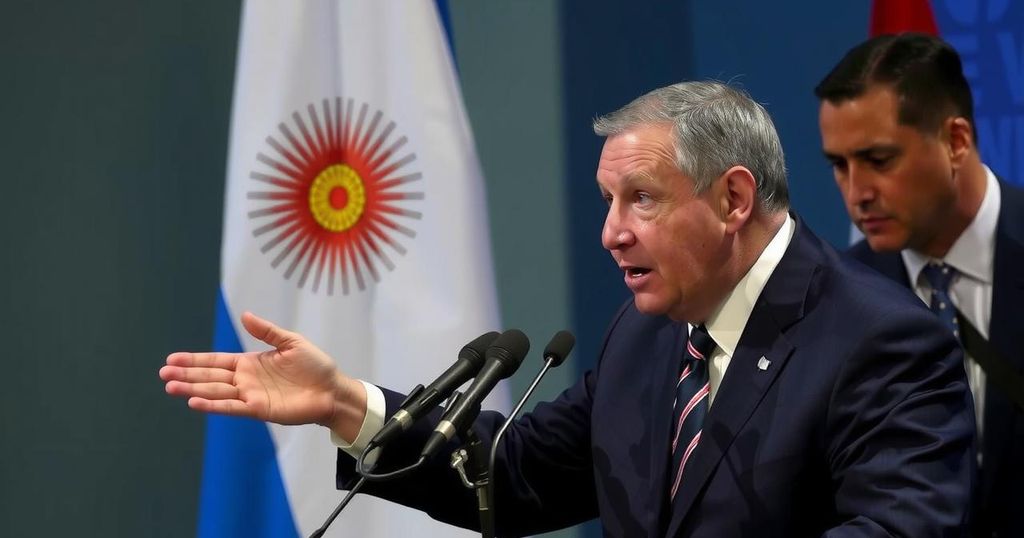Milei Dismisses Foreign Minister Following U.N. Vote on Cuba Embargo
Argentina’s President Javier Milei has dismissed Foreign Minister Diana Mondino after the country voted to support the lifting of the U.S. embargo on Cuba during a U.N. assembly session. The President’s office clarified that the dismissal was a direct reaction to the vote, emphasizing opposition to the Cuban dictatorship while indicating a realignment of foreign policy more closely aligned with the U.S. and Israel’s interests. Mondino’s recent controversies contributed to the culmination of her tenure.
In a significant political move, Argentina’s President Javier Milei terminated his foreign affairs minister, Diana Mondino, shortly after the nation voted in favor of lifting the United States’ economic embargo on Cuba during a session of the United Nations General Assembly. The announcement of Mondino’s dismissal was made by Manuel Adorni, a spokesman for Milei, citing the U.N. vote as the primary reason. Although Adorni refrained from providing further details, the President’s office later reinforced that the dismissal was linked to the vote, asserting, “Our country is categorically opposed to the Cuban dictatorship, and it will remain firm in promoting a foreign policy that condemns all regimes that perpetuate the violation of human rights and individual freedoms.” Following her dismissal, Mondino was replaced by Gerardo Werthein, Argentina’s ambassador to the United States. On the day of the decision, a total of 187 nations, including Argentina, voted in favor of a U.N. resolution that condemned the U.S. embargo of Cuba, while only the United States and Israel cast opposing votes. Since Javier Milei assumed office in December 2023, he has realigned Argentina’s foreign policy to align more closely with the interests of the U.S. and Israel, notably expressing unequivocal support for Israeli Prime Minister Benjamin Netanyahu amidst escalating tensions in Gaza. This stance diverges from the sentiments of many other Latin American nations, as countries like Bolivia and Colombia have severed ties with Israel, and several others have withdrawn their ambassadors from Tel Aviv. Mondino’s tenure as Foreign Minister had already been marked by controversy; just last week, her office faced backlash for mistakenly labeling the Falkland Islands instead of the Malvinas, their official name in Argentina. Furthermore, during a diplomatic visit to China aimed at improving bilateral relations, Mondino faced criticism for insensitive remarks that generalized the appearances of Chinese individuals. In light of these incidents, President Milei’s office announced plans to conduct an internal audit of the Foreign Relations Ministry to identify those promoting agendas misaligned with the government’s principles of freedom.
The recent dismissal of Argentina’s foreign affairs minister is rooted in a complex interplay of domestic and international politics. Argentina’s government, under President Javier Milei, has been reorienting its foreign policy toward greater alignment with the United States and Israel, reflecting a significant departure from the previous administration’s stance on several issues. This transition has sparked debates regarding human rights, international diplomacy, and national identity, particularly in relation to Cuba and Israel, two contentious topics in Latin American geopolitics. The U.N. vote to condemn the U.S. embargo of Cuba is emblematic of broader regional attitudes towards American influence and existing diplomatic relationships.
In summary, President Javier Milei’s decision to dismiss Foreign Minister Diana Mondino underscores a pivotal moment in Argentina’s foreign policy direction, particularly concerning relations with Cuba and international human rights issues. The President’s office has clearly stated its opposition to the Cuban regime and has shown its commitment to a diplomatic stance that prioritizes human rights. The realignment of foreign policy to favor U.S. and Israeli interests marks a significant shift, amid varied responses from other Latin American nations. This dismissal follows a series of controversies surrounding Mondino’s conduct in office, further highlighting the government’s intent to present a unified and coherent foreign policy.
Original Source: www.mymotherlode.com




Post Comment